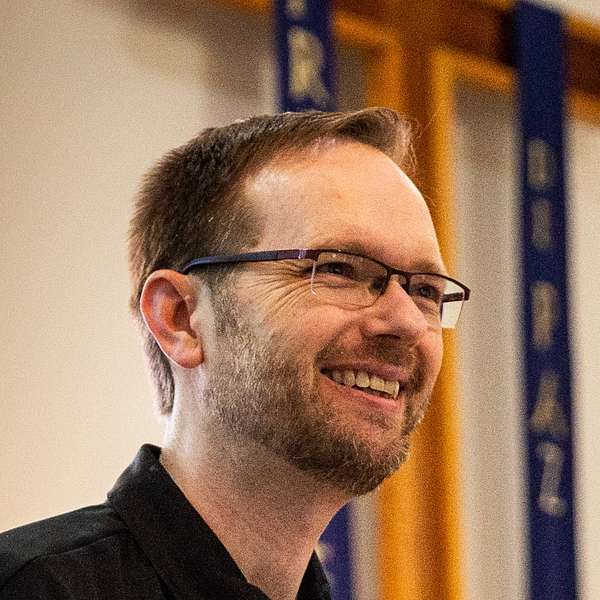
In the Way with Charles St-Onge
In the Way with Charles St-Onge
Pruned by Hardship
Use Left/Right to seek, Home/End to jump to start or end. Hold shift to jump forward or backward.
The Lord allows us to sin against each other, and for creation itself to visit evil on all of us, that some of us might repent and turn to him and each other in forgiveness for the sake of Jesus.
Check us out at ascensionlutheran.ca and intheway.org.
Martin Luther said there were three things that shaped a good pastor: prayer, study, and temptation. The German word that Luther uses meant trials, tribulations, even afflictions. Through these the Lord makes us strong.
Deb was reading an article the other day about “resistance training.” “What is that?” Think of the astronauts in space. Free floating, no gravity, everything is lighter than a feather. Do you know what that does to the human body? How do you counteract those effects? There has to be resistance to your muscles so they don’t weaken. They have to push back against something.
Author David Brooks pointed out in a New York Times article entitled “What Suffering Does” that people do not grow when things are going well, but only when things are not. “When people remember the past, they don’t only talk about happiness. It is often the ordeals that seem most significant. People shoot for happiness but feel formed through suffering….people in the midst of difficulty begin to feel a call. They are not masters of the situation, but neither are they helpless. They can’t determine the course of their pain, but they can participate in responding to it. They often feel an overwhelming moral responsibility to respond well to it….The right response to this sort of pain is not pleasure. It’s holiness. I don’t even mean that in a purely religious sense. It means seeing life as a moral drama, placing the hard experiences in a moral context and trying to redeem something bad by turning it into something sacred…Recovering from suffering is not like recovering from a disease. Many people don’t come out healed; they come out different.”
You have heard me quote author J.K. Rowling before. The life choices in front of us that really matter are not between right and wrong, but between right and easy.
The point I would have you see in this is that hardship leads to reflection, especially self-reflection. Self-reflection is not easy. But it is right. Because knowing ourselves rightly leads to us living life rightly before God and before our neighbours.
Which brings us to what Jesus teaches us today. Jesus has just warned the crowds about settling debts with our accuser before they drag you to court. “I tell you,” Jesus warns, “you will never get out until you have paid the very last penny” (Luke 12:59). Some come to him and ask, “What about the Galileans Pilate killed while offering their sacrifices to God?” Were their sacrifices unacceptable? What did they do to deserve that kind of fate?
Jesus does not answer the way we sometimes do. He doesn’t say, “God needed more angels in heaven” or “at least they’re at peace now.” Instead, he says, “Were they worse sinners than you? No.” But they weren’t less either! We are all in the same boat. The Lord allows your sin to hurt me, and my sin to hurt you, in the hopes that at least one, if not both of us, will turn from our sin and live.
Jesus supplies a second example: “Or the eighteen on whom the tower of Siloam fell. What about them?” You’re all in the same boat: creation itself is now subject to evil. The Lord allows the fallen creation to hurt me and you, in the hopes that at least one, if not both of us, will turn back to Jesus and live.
Then comes the parable, where the groundskeeper throws more manure around the tree, cutting it, pruning it, giving it time and care to make it bear fruit. This is us, and this is Jesus. Throwing manure around our roots, painfully cutting off branches and dead heading our flowers, that in the end we might bear fruit: “…Love, joy, peace, patience, kindness, goodness, faithfulness, gentleness, self-control” (Galatians 5:22–23, ESV).
Were it not for the hardships of life, for suffering, for trials, for anfechtung, we would walk through life without seeing our own hearts as the Lord sees them: in desperate need of his healing and care. We would not realize how much we are daily in need of the Lord’s help. The salvation of our Lord who would be willing to suffer at our hands that we might be healed in his.
For if anyone is a hearer of the word and not a doer, he is like a man who looks intently at his natural face in a mirror. For he looks at himself and goes away and at once forgets what he was like. (James 1:23–24, ESV)
Prayer and meditation – yes. But do not discount suffering. Your gardener and physician, Jesus our Lord, is working on you. Drawing you closer to himself, strengthening your faith, humbling your heart, so he might exalt you. So that through his cross and suffering, and now your cross and suffering, you might be saved forever. Amen.